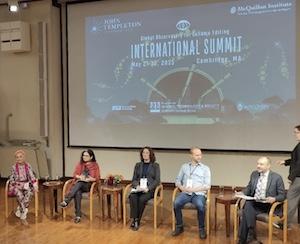Fourth International Summit on Genome Editing Emphasizes Ethical and Societal Concerns

Last week, May 21–23, a broad range of experts gathered in Boston to discuss the future of powerful biotechnologies with the potential to change what it means to be human. The fourth in a series of international Summits on human genome editing, this event was organized by the Global Observatory for Genome Editing, which “seeks to expand the range of questions arising at the frontiers of emerging biotechnologies … and fosters international, interdisciplinary, and cross-sectoral dialogue.” Like previous Summits, it addressed both heritable applications and somatic gene therapies.
The organizers prioritized including a more diverse program and speakers – experts in genome editing, bioethics, disability studies, public policy, religion, medicine, law, disability studies, public health and more, along with civil society advocates, artists, and journalists – with a far broader range of perspectives. In contrast, the first three Summits, which were organized by national science academies, focused primarily on scientific and technical issues, with limited attention to ethical and societal concerns.
For more on critiques of past Summits, check out CGS’ two-part event from 2023: Genetic Justice from Start to Summit.
This time around, most of the Summit speakers who specifically discussed heritable genome editing focused on its potential social and eugenic consequences, as well as the need to convene diverse voices and perspectives, including social justice and human rights. Scientific presentations were in the minority, scattered across panels that situated them among legal, religious, policy, and civil society perspectives. A similarly broad range of perspectives was included in a special issue of The CRISPR Journal (free to read for a limited time) that coincided with the Summit.
CGS associate director Katie Hasson spoke on the panel “Public Imaginations of Public Goods,” which asked “Whose visions guide the governance of genome editing—and whose are left out? What reforms are needed to make space for alternative visions of technological innovation and the public good?” Katie’s presentation focused on the importance of including civil society advocates representing social justice and human rights perspectives in discussions about powerful biotechnologies like heritable human genome editing.
She discussed examples of the different conversations that emerge when these voices are included, including unambiguous calls to forego heritable genome editing and to strengthen the existing prohibitions of it in many countries. Her remarks drew on CGS initiatives like the Missing Voices Initiative and Gender Justice and Disability Rights Coalition, and on efforts by our colleagues including the International Coalition to Stop Designer Babies and the Reproductive Justice Futurisms Think Tank Convening.
On Friday afternoon, as part of the Summit, CGS hosted a side event focused on “Bringing Excluded Voices to the Table.” Panelists Sarojini Nadimpally (Sama), Rosemarie Garland-Thomson (Emory University), Teresa Blankmeyer Burke (Gallaudet University) and Katie Hasson (CGS), along with moderator Françoise Baylis (Dalhousie University), explored what it looks like to truly include “missing” voices and why it is so important. The panelists highlighted the necessary work of bringing civil society and other excluded communities to discussions about human genome editing, as well as the challenges of ensuring that they can participate on their own terms and be heard by organizers.
At the conclusion of the Summit, the organizing committee released a statement that called for a “Charter on Emerging Technologies and Human Dignity” that would “set out principles to better organize the relations between emerging technologies and broader society,” as well as “guid[e] science and technology toward generating beneficial innovation.” The statement proposed several principles that might ground the drafting of such a charter, which include starting from questions of the common good, expanding the range of questions discussed, and rethinking limits on research.
Media coverage of the Summit underlined the broad range of perspectives and scope of the conversation, as well as how political attacks on scientific research and higher education influenced the discussions.
As of this writing, full-day video recordings of the event can be found on the Global Observatory’s YouTube page. Additional background reading and resources can be found here and on the Global Observatory website.



